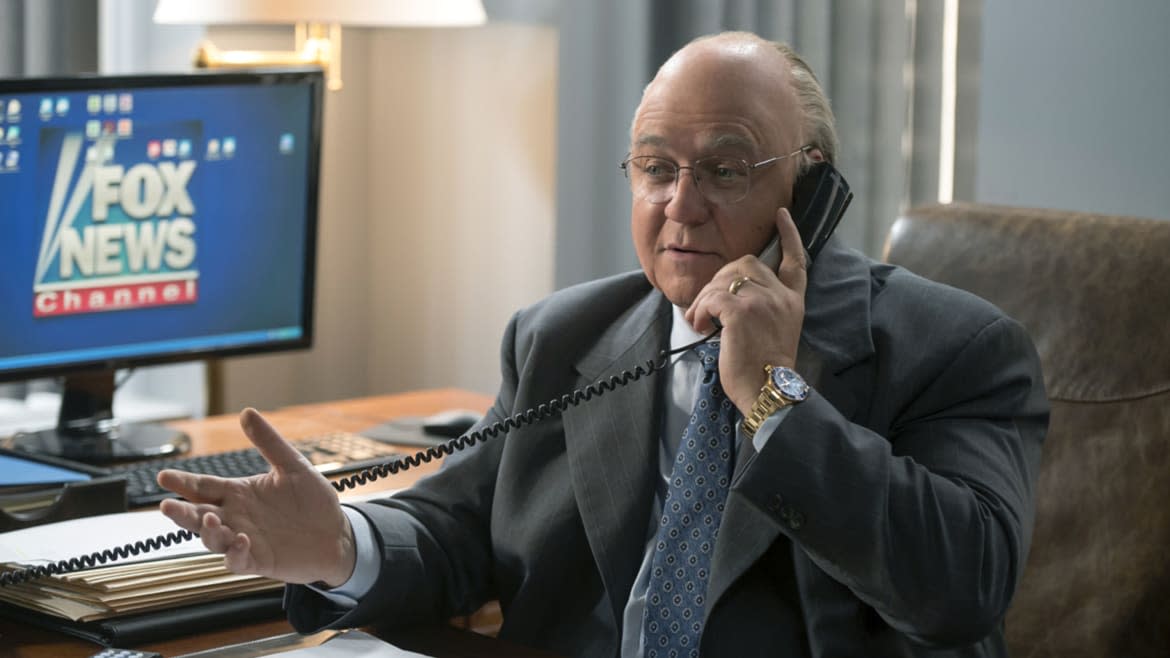‘The Loudest Voice’: Showtime’s Roger Ailes Series Lets Fox News Off Easy

When Roger Ailes found out that Gabriel Sherman was writing a deeply reported investigative book about his life, the Fox News CEO did everything in his power to shut it down. He tried to weed out potential sources, and hired private investigators to look into Sherman.
But if Ailes had known how Sherman’s book would eventually translate to the small screen—the medium the television news executive cherished—he may not have wasted his time.
Premiering next Sunday, Showtime’s The Loudest Voice is a seven-part miniseries chronicling the most consequential act of Ailes’ career: establishing Fox News, the conservative cable news behemoth that has played a crucial role in upending American politics and media.
The show’s main aim appears to be convincing viewers that Ailes, the television producer and onetime Republican political operative, was pulling the strings behind the scenes during some of the biggest political disasters and scandals in 21st century American politics. That’s not untrue: Sherman’s juicy book about the rise of Fox News and its larger-than-life former leader remains the most complete telling of Ailes’ life, and was ahead of its time in predicting the impact that Ailes and Fox News would have on modern politics.
But as a series, The Loudest Voice is a barely-coherent mess of half-explained events and decades-old mini-outrage news cycles. And where the show really fails is in its inability to give any compelling insight into who Ailes was, what compelled his ruthless drive to alter (and at times corrupt) American media, and why his enablers let him get away with it.
‘Divide and Conquer’: How the Cult of Roger Ailes Continues to Rule Fox News
John Oliver Blasts Fox News Host for Downplaying Possible War With Iran: ‘Breathtakingly Stupid’
The series could hardly be timelier. Fox News hosts jabber with and at the president, a former regular network guest, in real time about everything from college campus controversies to outright war with another country—and he listens. Right-wing television networks and media companies have popped up across the country with the goal of trying to get even further to the right of Fox.
The current political mood informs the show—Ailes literally says “Make America Great Again,” if the point wasn’t obvious enough. But the show has very little to say about Ailes, played by Russell Crowe, beyond the fact that he was not a good person and was responsible for producing a dark, toxic version of the news.
The show doesn’t explicitly glorify Ailes. Most of the three episodes available are a highlight reel of Ailes’ bad deeds: racism, encouraging the dissemination of dangerous (later false) information with catastrophic consequences, demeaning his employees, repeatedly cheating on his wife, sexually harassing his employees, covering up his own employees’ sexual harassment.
But the show spends far too much time obsessed with telling and retelling the viewer how Ailes acted as a dark genius puppeteer, rather than reckoning with the consequences of his actions. It whizzes through decades of Ailes’ programming decisions—putting Sean Hannity on the air, dubbing Obama a secret Muslim socialist, working in tandem with the Bush administration to gin up the war in Iraq—all while Crowe rants about America, The Media, and the evil of liberals. The show occasionally dispatches various disposable characters to tell Ailes off, but much more screen time is spent brooding and plotting with Ailes.
For a show where the word “Shakespearean” was probably dropped multiple times while the showrunners pitched to executives, there’s little attempt to actually understand what radicalized Ailes. By the time Showtime’s audience meet him, he’s already convinced that we should invade Iraq, President Barack Obama’s going to ruin the country, and Fox News should do whatever it takes to protect Bill O’Reilly from sexual harassment allegations. There are passing hints at Ailes’ difficult relationship with his father and the show mentions the Fox News chief’s hemophilia, but they’re played for eccentricity, aren’t explained, and don’t significantly advance the story. If Ailes ever has a moment of reflection or self-doubt, it’s not in the first half of the miniseries that was provided to press. The show seems more interested in running down a checklist of his actions, and far too bored by deeply interrogating them.
Even more troubling, the show fails to dedicate any serious weight to the cronies, henchmen, and enablers who executed his agenda. Rupert Murdoch is a major supporting character, but essentially exists in the show as a plot device, green-lighting projects for Ailes and occasionally chiding him with no explanation of where he stands. In the first several episodes, Ailes’ longtime PR attack dog Brian Lewis is more often given throwaway lines pushing back on him about programming decisions. The show doesn’t bother explaining why either Murdoch or Lewis occasionally push back at other times, or why anyone follows Ailes in the first place. One can only assume their character motivation is they enjoy getting yelled at and listening to uninspiring speeches (which Crowe delivers).
Worse, the women in the show are basically a blank slate for Crowe to rant at or prey on. Even if this is close to the truth of how Ailes interacted with some women at the network, the show gives the characters little to do other than be victims of their predatory boss.

Seth MacFarlane as Brian Lewis, Naomi Watts as Gretchen Carlson, and Russell Crowe as Roger Ailes in The Loudest Voice.
Functionally, The Loudest Voice is scattered and surface-level. Each episode pops in to Fox News during various eras the showrunners have deemed noteworthy. The first episode dedicates a substantial portion of the show—which lasts an hour—explaining how Fox News wasn’t ready for primetime. But by the second episode, with no explanation of what happened, Ailes is celebrating Fox News becoming the No. 1 network. The show is more like a montage of old news events where Fox News fanned the flames of paranoia, set to a distractingly ominous score.
The script is flat and unsurprising. Anemic performances follow. For all his monologuing, Crowe’s Ailes is forgettable, all unexplained mood swings and broad declarations about America and the Power of Television. Most of the dialogue in the first few episodes consists of Ailes talking at other characters in speech form, ruminating repeatedly on America, liberals, and The Media.
Other bit players are laughably bad—Patch Darraugh’s Hannity and (the brief glimpses we get of Naomi Watt’s Gretchen Carlson) lack the conviction and spark that for decades at Fox made them convincing, ridiculous, and disturbing.
The final episodes of the show will almost certainly address the consequences of Ailes’ flaws. We know his fate: forced out in disgrace and dead within a few months (but not before becoming an informal adviser to Trump). But by then, audiences will have been subjected to countless minutes of Crowe pontificating on various old news events that too often go unrebutted.
But if viewers are disappointed, they may be in luck: Another Ailes-era Fox News movie, with former host Megyn Kelly as its protagonist, is out later this year.
Got a tip? Send it to The Daily Beast here
Get our top stories in your inbox every day. Sign up now!
Daily Beast Membership: Beast Inside goes deeper on the stories that matter to you. Learn more.

